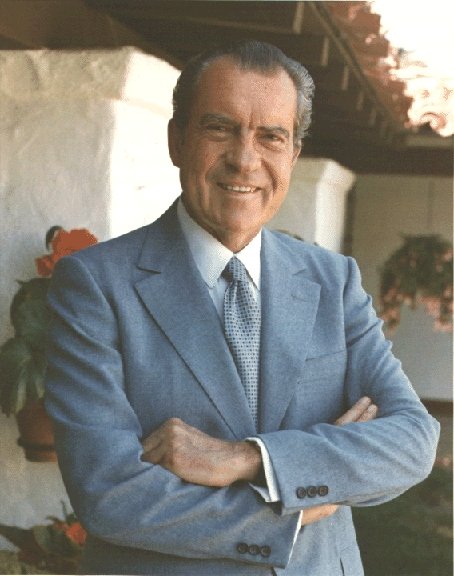
I decided to take a course about Richard Nixon this quarter taught by a former Nixon speech writer because I was eager to get a firsthand impression of the man and because ever since we watched All the Presidents Men in my high school journalism class, the Watergate burglary and subsequent coverup has fascinated me. Furthermore, Nixon as a person has remained something of an enigma to me. My impression before this course was that he did several bad things, but he had my sympathy because he was a man who achieved success not by winning popularity or looks contests but by working hard all his life.
As I began the course, I developed an even more sympathetic view towards Nixon. Some of the negative impressions I had of him were based on what I knew as his schmaltzy "Checkers speech" and his persistent investigation of former high-level State Department aide Alger Hiss. However, I began to understand through our readings in this course that Nixon's attempt to avail himself of accusations of campaign finance chicanery seemed justified since in fact, there appeared to be no evidence that he had done anything illegal. As for the Alger Hiss affair, it was eventually revealed that Hiss was acting as a spy against the government he worked for, so Nixon's hunch to investigate him seemed vindicated.
However, as we proceeded to study Nixon's career, my respect for him began to dwindle. I realized that even my own sense that he had such a difficult life was borne of Nixon's expressions of self-proclaimed hardships. Yes, Richard Nixon took some hard knocks in life, but, he seemed to use that as an excuse for his later indiscretions. For an idea of how another president publicly presented his difficult upbringing, one can look to Bill Clinton who grew up even poorer than Nixon but emphasized the hope that his life course signified. Unlike Nixon, who waxed kind of oddly at his final White House address that "my mother was a saint," Clinton seemed to have a more grounded and less self-validating view of his upbringing.
Furthermore, the fact that Richard Nixon never made a genuine expression of regret for his actions in the coverup of Watergate rankles me. His sense of those events, where he ordered the CIA to try to end the FBI investigation of the burglary and continued a massive effort at coverup therein, was that he never did anything that his "enemies" had not done, but as I wrote earlier and as others have pointed out, Nixon's corrupt acts far outnumbered his predecessors. There is evidence that he interfered in the 1968 Paris peace talks to end the war in Vietnam, that if true, means that he committed treason. He illegally bombed the country of Cambodia during that war, and even if he was not directly involved in the execution or ordering of the Watergate burglary, he ordered many other unethical and/or illegal actions be committed against Democrats.
Doing research for a final project on Nixon's relations with his successors has only hardened any sense I had that this man deserved our country's goodwill despite his transgressions. The conventional wisdom is that that "he mellowed and grew more philosophical" through his later years, but as this article suggests, he actually became more bitter in his obsession with getting Democrats. He and Clinton established a friendly relationship when Clinton came into office, and Clinton was the first president since Carter to invite Nixon to a public event at the White House. Until Nixon's death, they had relatively frequent phone calls with a good amount of personal exchange. However, Nixon thought that the Republicans should use suggestions that Clinton had been involved in an illegal real estate deal (of which he was later exonerated) to make him "pay the price" for what he felt was unfair targeting of himself over the years. Republicans must not "let [Whitewater] go down, must not let it sink," he said. Nixon called then-Senator Bob Dole to make sure aggressive questioners were placed on a Senate subcommittee looking into Whitewater. He also used his own personal understanding of Clinton to give Dole advice on the President's vulnerabilities (Nixon assumed Dole would be the 1996 nominee). Clinton for his part gave Nixon a gracious and some have suggested too generous eulogy at Nixon's funeral in April of 1994 where he said "May the day of judging President Nixon on anything less than his entire life and career come to a close."
Nixon's behavior towards Clinton, as I have come to learn, is characteristic Nixon and elicits a characteristic reaction about Nixon. When first reading about their relationship, my feelings warmed towards Nixon, as they had earlier in the course when reading about the misunderstandings around the Fund case and the Hiss case. I was taken in, as many have been, by the "New Nixon" posture. However, Nixon squandered any honorable gesture--as he always had--by allowing himself as usual to get caught up in his petty political vendettas and vortex of self-pity. Although I'm sympathetic to the fact that Nixon probably suffered from a psychological disease that made him depressed and angry, I think the revisionism on his character gives this small-minded man a lot more credit than is due.

2 comments:
Excellent and enlightening analysis!! I had not appreciated that Nixon milked his life difficulties. ~ harriet
Yeah, that's my perspective. I mean here's a man that achieved so much success and yet could express so much self-pity. I guess it's a lesson against being self-pitying to the point of self-destruction.
Post a Comment